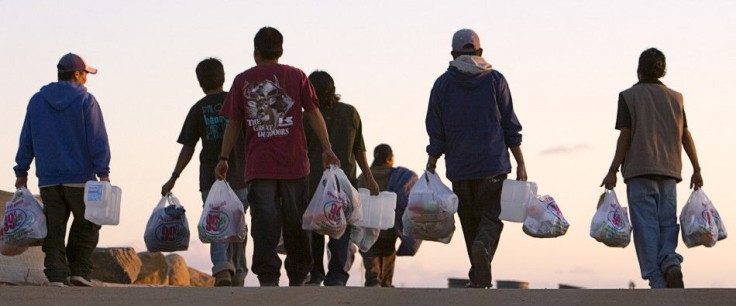California Democrats Buck Obama On Immigration, But Governor Sides With President

Immigration has yielded some prominent clashes between the federal government in the states over the last few years, as a tough new law in Arizona prompted a series of copycat laws and, eventually, a Supreme Court ruling.
Following Arizona's example of "attrition through enforcement" -- essentially, making life for undocumented immigrants in the United States so difficult that they are encouraged to leave -- Republican-controlled state legislatures passed harsh new immigration laws, claiming they were doing what the federal government would not.
While those bills were animated by a sense that the federal government was not doing enough to enforce immigration laws, Democratic lawmakers in California reached an opposite conclusion. They sent a bill to Gov. Jerry Brown, also a Democrat, that would have defied the federal government's requests to hold immigrants for possible deportation.
The Obama administration has overseen record numbers of deportations, something that is driven in part by cooperation between federal immigration authorities and local law enforcement. Under a program known as Secure Communities, initiated by President George W. Bush and enlarged by President Obama, law enforcement officers must share the fingerprints of people they arrest with federal authorities.
If the Department of Homeland Security matches those fingerprints with an undocumented immigrant who has committed a deportable offense, they can issue a request for law enforcement officials to hold the detained immigrant. The California bill, the Trust Act, would have allowed local authorities to ignore those requests and free detained immigrants.
The bill made exceptions for immigrants who had been committed of violent felonies, but Gov. Brown said this safeguard did not go far enough.
"The list of offenses codified in the bill is fatally flawed because it omits many serious crimes,” Brown wrote. “For example, the bill would bar local cooperation even when the person arrested has been convicted of certain crimes involving child abuse, drug trafficking, selling weapons, using children to sell drugs, or gangs."
But Brown appeared to endorse the arguments of Secure Community's critics, who argue that the program sweeps up many immigrants with nonexistent or nonviolent criminal records, fractures families and undermines public safety by making immigrants unwilling to work with police officers.
“Until we have immigration reform, federal agents shouldn’t try to coerce local law enforcement officers into detaining people who’ve been picked up for minor offenses and pose no reasonable threat to their community," Brown wrote.
The resistance to Secure Communities reflects immigration advocates' lingering frustration with President Obama, who has presided over more than a million deportations and has failed to deliver on his promise of comprehensive immigration reform.
Obama aggressively expanded Secure Communities, overriding allies -- including the Democratic governors of Illinois, Massachusetts and New York -- who said the program was not working. Chicago Mayor Rahm Emanuel, a former White House chief of staff, proposed a measure earlier this summer that, like the stalled California bill, would have prohibited Chicago police officers from turning some immigrants over to federal authorities.
The administration has maintained throughout that it is focused on deporting immigrants who have serious criminal records or pose a threat to public safety. Officials announced guidelines last summer urging immigration agents to shift their attention away from nonviolent undocumented immigrants, and the administration recently unveiled a program that allows undocumented immigrants who were brought to the country as children to apply for "deferred action," enabling them to avoid deportation and secure work permits.
Governor Brown also signed legislation allowing immigrants who obtain deferred action to obtain state drivers licenses. While the program does not confer any sort of legal status or path to citizenship, states have been divided on the question of what benefits can flow to immigrants who get a reprieve.
© Copyright IBTimes 2024. All rights reserved.











